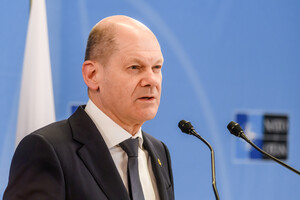Ostpolitics is now a losing policy.

Politico .
But Russia's war against Ukraine undermined the authority and influence of Berlin in Central and Eastern Europe and, very importantly, among the leaders at the European Council table. This includes the resignation at the end of last year of longtime Chancellor Angela Merkel, the formation of a more complex tripartite ruling coalition in Berlin, and especially a number of political mistakes and inconsistent statements related to Russia's policy and the Russian-Ukrainian war.
The result has been a marked weakening of Berlin's influence and a greater willingness on the part of other countries to go their own way and, in some cases, openly challenge the Franco-German alliance , which has long been the center of power and decision-making in the EU.
“We do not need the protection of Germany; history has shown that it is not on the other side of history,” said one Eastern European diplomat, referring to Berlin's long-standing policy of soft treatment of Moscow. “Poland has shown good leadership in Russia, in accepting [Ukrainian] refugees, in refusing gas. The Baltic states have smart leadership. Bulgaria has a new government that is more trustworthy. Romania is stable,” the European diplomat told Politico.
The collapse of Germany's prestige was demonstrated this week as EU heads of state and government sought to reach an agreement on embargo on Russian oil and overcome fierce opposition from Hungarian Prime Minister Viktor Orban.
This time, Germany has been accused of because it was trying to take advantage of the proposed exemption from the embargo on oil supplied by pipelines.
But the fact that other countries -EU members, including Eastern ones, were suspicious of this, emphasizes undermining confidence in Berlin .
Meanwhile, the previous visit to Budapest by the President of the European Commission Ursula von der Layen, a former German defense minister and a student of Merkel, has not led to a breakthrough in the opposition to the ban on oil supplies. And Hungary's dispute with the Rule of Law Commission has made it even harder to reach a compromise.
Instead, European Council President Charles Michel, the former prime minister of Belgium and France, who holds the presidency of the EU Council, had to find a compromise, which was eventually reached by Hungary, paving the way for not only a ban on oil but a wider sixth package. sanctions .. Merkel's successor, Social Democrat Olaf Scholz, did not play a key role .
< p> “ Scholz is a real problem “He is simply behaving like a mercantile German, instead of compromising what Merkel was like.” No one will replace Merkel. “According to the diplomat, Scholz can at best be called an” Ecofin guy “- a member of the Economic Council and finance, which consists of the country's finance ministers, a position Scholz previously held.
A German official denied the allegations, saying that “criticism from such countries only shows that Germany is playing a leading role” in finding compromises at EU level at this difficult time.
Scholz himself said on Tuesday that the two-day summit “underlined Europe's great unity and solidarity with Ukraine” – an achievement he also sought to credit himself with, including financial aid to Germany, the reception of refugees and additional military aid to Kyiv. provided through a tank exchange agreement with Greece.
See special topic: Explosions in Lviv region: two people injured no. Britain has asked the United States to approve the supply of long-range MLRS to Ukraine – Politico This is the M270. Battle of Severodonetsk: Armed Forces counterattacked and captured prisoners 80% of the city occupied. Focus: Germany's words and actions in support of Ukraine differ so much that it seems absurd In Berlin, the Minister of Foreign Affairs became the biggest advocate for the transfer of heavy weapons to Ukraine, but the real actions of the German government do not correspond to the determination it demonstrates. The United States has recognized that it is helping Ukraine with hacker attacks Hackers are conducting “offensive, defensive and informational” operations.




